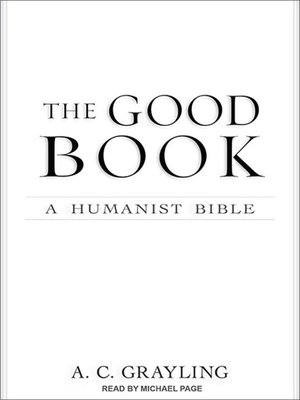
Sign up to save your library
With an OverDrive account, you can save your favorite libraries for at-a-glance information about availability. Find out more about OverDrive accounts.
Find this title in Libby, the library reading app by OverDrive.



Search for a digital library with this title
Title found at these libraries:
| Library Name | Distance |
|---|---|
| Loading... |
Few, if any, thinkers and writers today would have the imagination, the breadth of knowledge, and the literary skill to conceive of a powerful secular alternative to the Bible. But that is exactly what A. C. Grayling has done, creating a nonreligious Bible drawn from the wealth of secular literature and philosophy in both Western and Eastern traditions, using the same techniques of editing, redaction, and adaptation that produced the holy books of the Judeo-Christian and Islamic religions.
The Good Book consciously takes its design and presentation from the Bible, in the beauty of its language and its arrangement into short chapters and verses, offering to the nonreligious seeker all the wisdom, insight, solace, inspiration, and perspective of various secular humanist traditions. Organized in twelve main sections, The Good Book opens with meditations on the origin and progress of the world and human life in it, then devotes attention to the question of how life should be lived, how we relate to one another, and how vicissitudes are to be faced and joys appreciated. Inspired by the work of Herodotus and Lucretius, Confucius and Mencius, Seneca and Cicero, Montaigne, Bacon, and so many others, The Good Book will fulfill its audacious purpose in every way.
The Good Book consciously takes its design and presentation from the Bible, in the beauty of its language and its arrangement into short chapters and verses, offering to the nonreligious seeker all the wisdom, insight, solace, inspiration, and perspective of various secular humanist traditions. Organized in twelve main sections, The Good Book opens with meditations on the origin and progress of the world and human life in it, then devotes attention to the question of how life should be lived, how we relate to one another, and how vicissitudes are to be faced and joys appreciated. Inspired by the work of Herodotus and Lucretius, Confucius and Mencius, Seneca and Cicero, Montaigne, Bacon, and so many others, The Good Book will fulfill its audacious purpose in every way.






